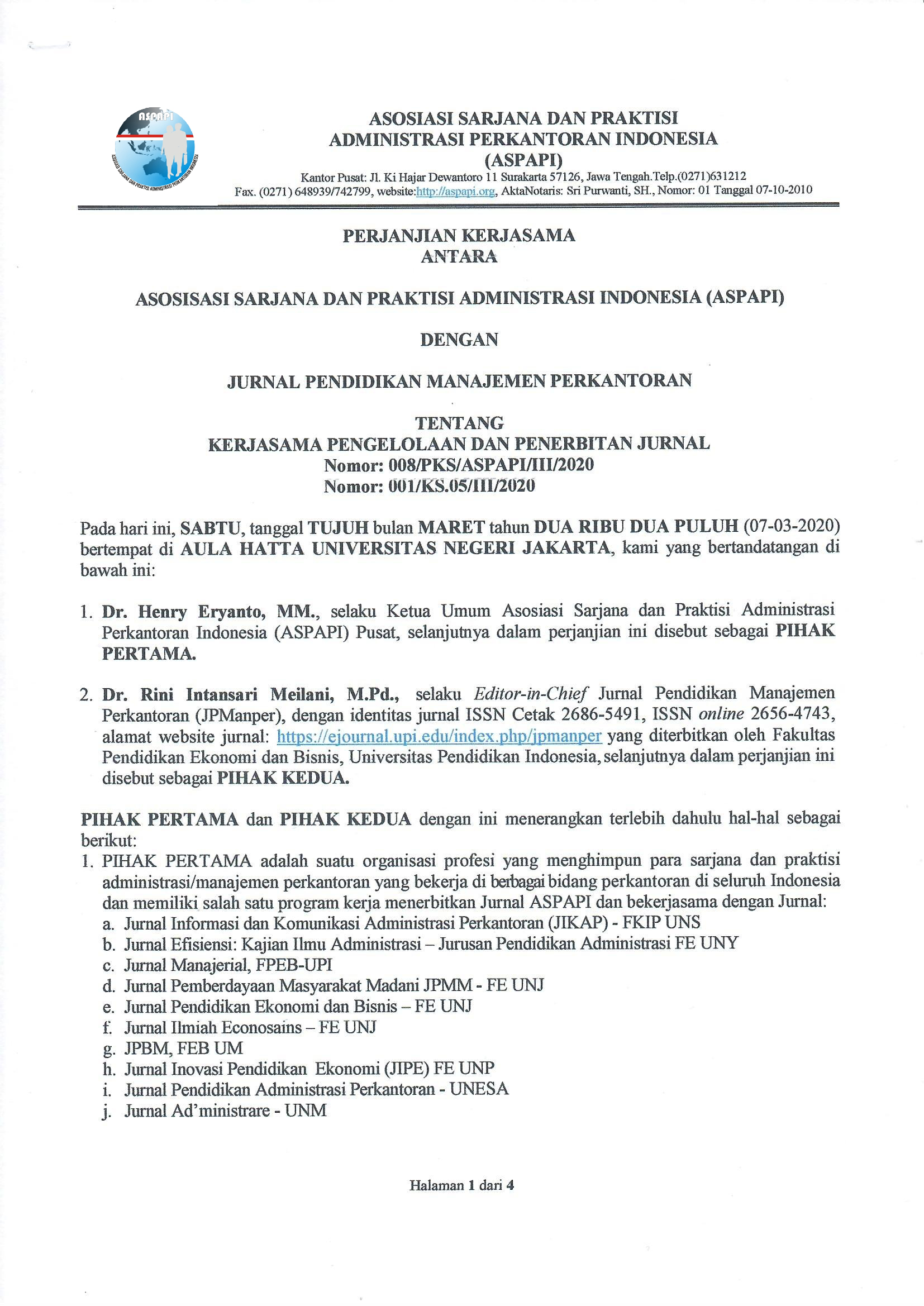PERAN EFIKASI DIRI DAN MOTIVASI BELAJAR DALAM MENINGKATKAN HASIL BELAJAR SISWA SEKOLAH MENENGAH KEJURUAN
Abstract
The purpose of this study was to analyze influence self efficacy and learning motivation to learning outcomr. This research used survey method. Data collection techniques used question model on scale of 1-5 with likert scale,. The respondents are students of Vocational High School in Kabupaten Bandung Barat . Data were analyzed using multiple linear regression. The result of the study revealed self efficacy and motivation learning both partially and simultaneously, has the positive and significant influence toward influenced students’ learning outcomes. Thus students’ learning outcomes can be improved through increased self efficacy and learning motivation.
ABSTRAKPenelitian ini bertujuan untuk menganalisis pengaruh efikasi diri dan motivasi belajar terhadap hasil belajar siswa dengan menggunakan metode survey explanatory. Teknik pengumpulan data menggunakan angket dengan skor rentang 1 sampai 5 model Likert. Responden adalah guru Sekolah Menengah Kejuruan di Kabupaten Bandung Barat. Teknik analisis data menggunakan regresi berganda. Hasil penelitian diperoleh bahwa efikasi diri dan motivasi belajar siswa memiliki pengaruh yang positif dan signifikan terhadap hasil belajar siswa, baik secara parsial maupun simultan. Oleh karena itu, hasil belajar dapat ditingkatkan melalui peningkatan efikasi diri dan motivasi belajar.
Keywords
Full Text:
PDFReferences
Abd-elmotaleb, M., & Saha, S. K. (2013). The Role of Academic Self-Efficacy as a Mediator Variable between Perceived Academic Climate and Academic Performance, 2(3), 117–129.
Al-baddareen, G., Ghaith, S., & Akour, M. (2015). Self-Efficacy , Achievement Goals , and Metacognition as Predicators of Academic Motivation. Procedia - Social and Behavioral Sciences, 191, 2068–2073.
Anggraini, E. D., Winatha, I. K., & Rusman, T. (2016). Pengaruh Efikasi Diri, Kecerdasan Adversitas, Motivasi Belajar terhadap hasil belajar. JEE (Jurnal Edukasi Ekobis), Vol 4, No.
Baanu, T. F., & Oyelekan, O. S. (2016). Self-Efficacy and Chemistry Students ’ Academic Achievement in Senior Secondary Schools in North-Central ,. Journal of Educational Science, 4(1), 43–52.
Daud, F. (2012). Pengaruh Kecerdasan Emosional (EQ) dan Motivasi Belajar terhadap Hasil Belajar Biologi Siswa SMA 3 Negeri Kota Palopo. Jurnal Pendidikan Dan Pembelajaran Page. 243-255, Vol 19, No, page. 243-255.
Fitriana, S., Ihsan, H., & Annas, S. (2015). Pengaruh efikasi diri, aktivitas, kemandirian belajar dan kemampuan berpikir logis terhadap hasil belajar matematika pada siswa kelas VIII SMP. Journal of EST, Volume 1, Nomor 2,. September 2015 Hal 86 –101 86 ISSN:2460-1497, 1(September), 86–101.
Huang, C. (2016). Achievement goals and self-ef fi cacy : A meta-analysis. Educational Research Review, 19, 119–137.
James Raffini. (1994). Student Motivation To Learn, (92), 1–7.
Kraiger, K., Ford, J. K., & Salas, E. (1993). Application_of_Cognitive_Skill-Based_and_Affective.pdf. Journal of Applied Psycholohical Association, Vol 78 no, 311–328.
Mandolang, Gladies, F., Pangkey, I.J, R., Tawas, & Yance. (2013). Pengaruh Motivasi Belajar Terhadap Hasil Belajar Siswa Pada Mata Pelajaran Ekonomi Di Kelas XI Ips Sma Negeri 1 Manado. Jurnal Pendidikan Ekonomi, Vol 1, No.
Mappeasse, M. Y. (2010). Pengaruh Cara Dan Motivasi Belajar Terhadap Hasil Belajar Programmable Logic Controller ( Plc ) Siswa Kelas Iii Jurusan Listrik Smk Negeri 5 Makassar, 1, 1–6.
Niehaus, K., Rudasill, K. M., & Adelson, J. L. (2012). Intrinsic Motivation , and Academic Outcomes Among Latino Middle School Students Participating in an After-School Program.
Ohia, U. O. (2015). A Model For Effectively Assessing Student Learning Outcomes. The Journal of Effective Teaching, Vol. 15, N(3).
Purwanto, M. N. (2011). Psikologi Pendidikan. Bandung: PT Remaja Rosdakarya.
Qudsyi, H., & Irma, M. (2016). Self-efficacy and anxiety of National Examination among high school students, 217, 268–275.
Rizkiana Nurutami & Adman. (2016). KOMPETENSI PROFESIONAL GURU SEBAGAI DETERMINAN. Jurnal Pendidikan Manajemen Perkantoran, Volume 1, 126–134.
Sardiman, A. M. (2011). Interaksi dan Motivasi Belajar Mengajar. Jakarta: Rajawali Press.
Slameto. (2015). Belajar dan faktor-faktor yang mempengaruhinya. Jakarta: Rineka Cipta.
Sudjana, N. (2009). Penilaian Hasil Proses Belajar Mengajar. Bandung: PT Remaja Rosdakarya.
Syamsuddin, M. A. (2007). Psikologi Kependidikan Perangkat Sistem Pengajaran Modul. Bandung: PT Remaja Rosdakarya
Watson. (2002). The role and integration of learning outcomes into the educational, 3(3): 205–(Cic).
Zimmerman, B. J. (2000). Self-Efficacy : An Essential Motive to Learn, 82–91
DOI: https://doi.org/10.17509/jpm.v2i2.8111
Refbacks
- There are currently no refbacks.
Copyright (c) 2017 Jurnal Pendidikan Manajemen Perkantoran
Jurnal Pendidikan Manajemen Perkantoran View My Stats



